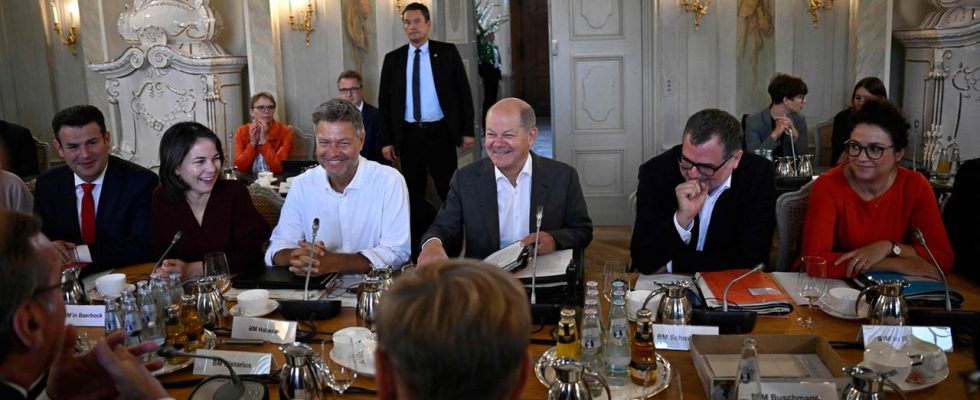analysis
During its cabinet meeting, the traffic light coalition initiated numerous projects and demonstrated harmony. And yet there was at least one elephant in the room.
Up to the final statement of the cabinet meeting in Meseberg, a very specific word was missing on the second day – and certainly not by chance: Nobody here wanted to talk about the “restart” of the traffic light coalition. If Chancellor Olaf Scholz has his way, he doesn’t need it either, at most it’s about better communication strategies. After all, as he often emphasized, the traffic light coalition’s track record is impressive.
One still feels that he is relieved to be able to get started faster with network expansion and bureaucracy reduction than in the days of the grand coalition.
Feel-good event after a false start
And yet it was clear to every member of the cabinet that the public’s expectations of a new start after the summer break were high – after the messed up first half of the year for the alliance of SPD, Greens and FDP.
Not only that the bureaucracy index had risen in the past two years, as Justice Minister Marco Buschmann self-critically noted in Meseberg. There is a tough spring behind the coalition – with the Graichen affair, combined with the haggling of the FDP versus the Greens about the heating law, which continued elsewhere – namely the agreement on basic child security – until Sunday.
For the Chancellor, a situation that does not correspond to his way of doing politics: If Scholz had his way, there would be more silent government. If possible, discussions would be held behind closed doors, experts would be listened to, it would be better to think a little longer and then come out as one. He would therefore like a “silencer” for his coalition in future conflicts.
No controversial issues on the agenda
Externally, the retreat is intended to send the signal of tackling economic development through tax breaks and bureaucracy reduction, which SPD man Scholz, Green Economics Minister Robert Habeck and FDP Finance Minister Christian Lindner presented after just a few hours – possibly to take pressure off and show it : We tackle it.
For the moment, Scholz’ claim has been implemented and fulfilled in Meseberg: In the rather compact meeting – one afternoon, one evening and the following morning – no dispute got out, if there was one at all. Probably also because there was nothing on the agenda that invited arguments.
Even at the final press conference, Scholz, Habeck and Lindner seemed to have decided not to reveal any differences of opinion, despite critical questions. The chancellor, who had recently even been criticized by his own parliamentary group for a lack of leadership and poor communication, wanted to use the appearance to show that he was in charge of action.
A retreat to the Chancellor’s taste
Unresolved questions, such as the industrial electricity price proposed by Habeck with the support of the SPD parliamentary group and party leadership, or a reduction in electricity tax preferred by Lindner, were deliberately avoided. Instead, Lindner and Habeck praised the autonomy and the contributions to the debate of the parliamentary groups.
A retreat that was entirely to the taste of the chancellor: Not only was everyone able to unite behind the projects presented in public – in the non-public rounds there was also the aspiration to broaden the view beyond everyday government life: experts from science and business gave lectures on artificial intelligence as a future technology for improving administrative digitization and on digital progress between data use and data protection.
“trigger points” of society
One hears in government circles that the cabinet was impressed by an analytical view of society as a whole by the sociologist Steffen Mau, who spoke about social trigger points – and the question of how divided society really is, how irreconcilable camps are opposed to each other – but also where there is a large consensus.
You can hear topics that led to coalition partners continuing to discuss them in many table talks until midnight – the hard core even until half past one in the morning. Habeck summed it up the following day: The pressure on society and politics was “very, very high”. It helps to understand “that different perspectives are a strength”. An appeal that is clearly directed towards the inside of the traffic lights.
The bad poll numbers were not an issue
“So we can do it differently!” At least Scholz, Habeck and Lindner may have returned to Berlin on Wednesday afternoon with such a feeling of satisfaction – and yet they have to admit that this was only possible because a lot was left out.
But the elephant in Meseberg’s rooms was noticeable: the poor poll numbers of the government and ruling parties as well as the AfD’s soaring. So far, the coalition has not found a recipe for either – and both may not fit at all with the mantra of the positive current account presented by Scholz.
The political differences between the coalition parties and how to deal with them were also largely ignored. While the SPD and the Greens tend to try to present traffic light compromises as joint political successes, the FDP seems to have settled on a different strategy: not letting themselves be taken over too much by red-green projects, but avoiding the worst, even slipping into the opposition role .
Another meeting might be needed, then behind closed doors, to question this togetherness – or to develop a different communication strategy that could be summarized like this: “We’re just like that, things are noisier with us and not without dispute , but then something comes out of it.” That’s roughly how Lindner sounded the new motto in Meseberg.
At the penultimate spring retreat in Meseberg, there was a lecture on the subject of “confidence” – which this unusual coalition will continue to need.
With information from Claudia Buckenmaier and Michael Strempel, ARD capital studio

